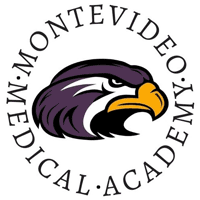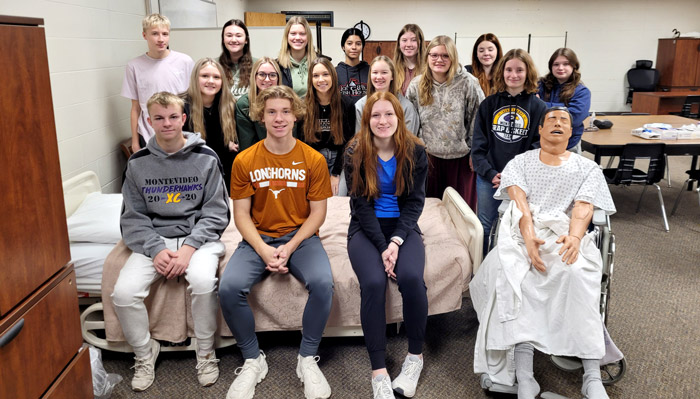Montevideo Medical Academy
- Need: To increase the future healthcare workforce in rural Minnesota.
- Intervention: Montevideo Medical Academy helps students explore healthcare career options and gain college credit.
- Results: So far, 25 students in the program have attained 170 college credits, 55 certifications, and 304 hours of clinical experience.
Description
In the Montevideo Medical Academy, high school students in rural Montevideo, Minnesota, have the opportunity to complete 22 college credits and earn industry certifications in Certified Nursing Assistant (CNA), Trained Medication Aide (TMA), Pharmacy Technician, and First Aid/CPR. Students interact with local healthcare employers throughout the year by job shadowing, participating in site tours, bringing healthcare professionals into the classroom, and completing internships and externships.

The Montevideo Medical Academy was developed through partnerships that included Montevideo Public Schools, the CCM Health system, the Minnesota River Area Agency on Aging, and Minnesota West Community and Technical College. The program has received funding from LYFT Career Pathways and the Southwest Initiative Foundation.
Services offered
Students can earn 22 college credits and receive certifications in Certified Nursing Assistant (CNA), Trained Medication Aide (TMA), Pharmacy Technician, and First Aid/CPR. Students also job shadow, participate in site tours, receive classroom visits from healthcare professionals, and complete internships and externships.
Results
The 25 students enrolled in the Montevideo Medical Academy attained a combined:
- 170 college credits
- 55 certifications
- 304 hours of clinical experience
Students also participated in:
- 6 panel discussions with local healthcare providers
- Tours of 4 local facilities
- Simulations on aging conditions
In recognition of this program, Montevideo High School was listed as a 2023-2024 Star of Innovation Award Winner (Silver Star category) by the Minnesota Association of Secondary School Principals.
In addition, program coordinators presented their work at the 2024 Minnesota Rural Health Conference and at the Minnesota Rural Education Association Greater Education Summit in November 2024.
Challenges
Challenges included:
- Start-up costs
- Finding qualified instructors
- Finding and credentialing facilities
- Ongoing commitments both financially and in human resources
- Long-term student recruitment for sustainability
- Establishing post-secondary partnerships
Replication
Have a clear vision of what you want the program to be in order to bring partners along with the concept. Have decision-makers from key partners involved from the beginning in order to ensure feasibility of finance, staffing, facilities, and availability and to manage expectations.
Have a point leader at the high school level who does quality control, is engaged in student recruitment and satisfaction, and coordinates community partnerships.
Sustainability of the program will rely heavily on student engagement and interest. Students who have a great experience will share that with other students. The opposite will also be true. Therefore:
- Be clear with students from the beginning about expectations, work load, time requirements, and attendance policies.
- Ensure students are prepared to enter college-level coursework.
- Follow-up with them often throughout the course.
Develop a good relationship with the instructor (if the instructor is external) in order to support student progress.

Contact Information
Kati Birhanzl, Career CoordinatorMontevideo High School
Montevideo Medical Academy
320.269.6446 Ext. 1128
kbirhanzl@montevideoschools.org
Topics
Children and youth
· Health workforce pipeline
· Schools
States served
Minnesota
Date added
July 24, 2024
Suggested citation: Rural Health Information Hub, 2024 . Montevideo Medical Academy [online]. Rural Health Information Hub. Available at: https://www.ruralhealthinfo.org/project-examples/1142 [Accessed 28 December 2025]
Please contact the models and innovations contact directly for the most complete and current information about this program. Summaries of models and innovations are provided by RHIhub for your convenience. The programs described are not endorsed by RHIhub or by the Federal Office of Rural Health Policy. Each rural community should consider whether a particular project or approach is a good match for their community’s needs and capacity. While it is sometimes possible to adapt program components to match your resources, keep in mind that changes to the program design may impact results.
